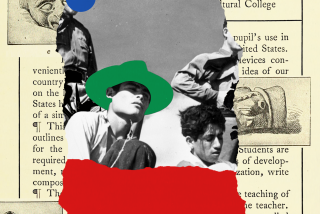BOOK REVIEW : History Shines as a Tragic Hero of Novel : ASYA <i> by Michael Ignatieff</i> ; Alfred A. Knopf, $22, 309 pages
- Share via
If time is a river, history is an eddy in the river. Everything circles and comes back, though in a different landscape. Michael Ignatieff’s suggestive novel traces such an eddy over the last 75 years of Russia’s history. Notice the servants.
Near the beginning, with the Bolsheviks taking power, Prince Galitzin’s butler mutters in satisfaction as he puts coarse gray bread on the table of his indignant master. It is “the bread of the people.”
At the end, in 1990, a feeble old woman who was once the Princess Galitzine revisits Moscow. Something in her bearing, her speech, her expectation, move the driver and the cook--assigned by the Soviet authorities to the household of her foreign host--to instinctive reverence.
The princess--Asya--is the swimmer in the eddy. Valiant, passionate, innocent, she struggles through a life of violent upheaval, moving not as she swims, but as the water carries her. Yet--by her persistence--surviving until the circling current comes around.
“Asya” begins in one of those lost paradises evoked by Tolstoy and later by Nabokov. Asya’s family moves between their country estate and their St. Petersburg mansion. She is a strong-minded, independent child and her father’s darling.
Her strength and independence land her a nurse’s position in World War I. They will keep her going when the Revolution breaks out, her father dies, she works in a White Army hospital and finally, with the Red Army closing in, escapes to France.
She is pregnant; Sergei, her lover, is a White officer. When her child, Nikki, is 6, Sergei turns up in Paris, starved and shaky after years in a Soviet prison camp. Asya, who works as a nurse and has had several love affairs, passionately welcomes him back. They marry.
Before long, Sergei has a flourishing business exporting Western machinery to the Soviet Union; he makes money, and they live well. Asya’s happiness is shadowed by his frequent absences and by the antagonism between Sergei and Nikki, who grows up to join an extreme rightist exile group and excoriates his father for doing business with the Soviets, and worse.
We sense this “worse” almost at once. Sergei’s privileged dealings with Soviet officials signal it; so does his bitter remark when he is reunited with Asya and speaks of his prison experiences: “I am what they did.”
He is, that is, a Soviet agent and everyone seems to know it except his wife. It is a betrayal, but she is surrounded by betrayals.
Sergei goes to Poland on the eve of World War II and is not heard of--directly--again.
Her two dearest friends--Botynsky, an intellectual who has been her lover, and Razumkin, a wealthy exile--turn out to have a network of shadowy, and mortally opposing, connections with rival exile groups and the French Intelligence Service.
Nikki will end up working for the Germans and die serving in the German Army in Russia.
Asya, who escapes to Britain when the Germans invade France, learns of these things only gradually. At the end, with perestroika, she returns to Russia to try to trace Sergei, who has risen high in the Soviet Intelligence Service and is either dead or deliberately unavailable.
A circle of betrayals, gradually revealed, would seem to make a bitter story. But that is not the point or the spirit of Ignatieff’s novel. If there is a betrayer, it is history.
Sergei is a passionate patriot; his time in prison convinced him that only Stalin’s harsh discipline could unite his country, make it progress, defend it against the Germans. Sergei is not uncritical. He is appalled by the use of slave labor and more radically appalled by Stalin’s purge of his best generals on the eve of the war.
Botynsky’s secret ties with the French police are an effort to frustrate Soviet infiltration and assassination among the exiles.
Razumkin’s motives are more squalid, but in his Chekhovian way, he is a kind of corrupt, self-indulgent innocent. And Nikki is as inflamed a patriot as his father, though on the opposite side. Both sides are bloody and terrible.
With subtlety and moral lucidity, Ignatieff has succeeded in limning the twists of human lives in terrible times. There is a cleanness in his writing and a sense of compassion. He comes from a White Russian family himself, and we feel his love--particularly in the lovely scenes from Asya’s childhood--of his ancestral coun try. He is a journalist, historian and critic, and this is his first novel. Perhaps that is why the weakest thing in the book are the characters. Those briefly glimpsed--a French security man, an old aunt--are well rendered. Those more fully portrayed are indistinct.
Ignatieff has tried to suggest complexity and contradiction. But with Asya and Sergei, in particular, these complexities are not truly assembled. We know the characters less by what they are than by what they do or by what is done to them.
Ignatieff’s one major, shining, rounded character is history. He makes it mysterious, potent, deceptive, terrible, ironic and, in the end, forgiving. Ignatieff’s History is a tragic hero out of Shakespeare.
Next: Elaine Kendall reviews “The Blue Mountain” by Meir Shalev (HarperCollins)
More to Read
Sign up for our Book Club newsletter
Get the latest news, events and more from the Los Angeles Times Book Club, and help us get L.A. reading and talking.
You may occasionally receive promotional content from the Los Angeles Times.










